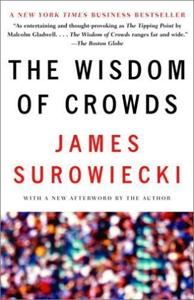
Want to learn the ideas in The Wisdom Of Crowds better than ever? Read the world’s #1 book summary of The Wisdom Of Crowds by James Surowiecki here.
Read a brief 1-Page Summary or watch video summaries curated by our expert team. Note: this book guide is not affiliated with or endorsed by the publisher or author, and we always encourage you to purchase and read the full book.
Video Summaries of The Wisdom Of Crowds
We’ve scoured the Internet for the very best videos on The Wisdom Of Crowds, from high-quality videos summaries to interviews or commentary by James Surowiecki.
1-Page Summary of The Wisdom Of Crowds
Overview
How can we get people to work together towards the best possible outcome? In a contest at a livestock fair in 1906, Francis Galton noticed that although no individual could guess an ox’s exact weight, the mean value of all their estimations was only one pound off from its actual weight. The collective estimate was more accurate than any individual one.
Galton discovered that groups of people are wiser than individual members. This is also true in the show, Who Wants to be a Millionaire? Candidates can use lifelines such as Ask-the-Expert or Ask-the-Audience for help and they’re right more often than experts.
However, not all groups are wise. We see raging crowds and violent mobs in history. As Friedrich Nietzsche once said, “Madness is rare in individuals – but in groups, parties, nations and ages it is the rule.”
But there are some problems with collective intelligence. For example, a group might make bad decisions if they’re not diverse and don’t work as a team. However, if the group is diverse and works together to foster open dialogues, then the “wisdom of crowds” becomes more than just an empty phrase—it’s actually true.
Large groups of people can solve problems better than individuals.
Big Idea #1: The more diverse a group of people, the wiser its decisions.
A group of people with different ages, genders, religions and professions is often better at tackling problems than a homogeneous one. In this type of group, each person introduces new ideas that would never have seen the light of day in a homogeneous group.
Groups that are made up of people with the same skills and approaches have a disadvantage. They’re not able to consider counterarguments as easily, which makes it harder for them to think unconventionally.
The Bay of Pigs invasion is one example of how an opinion that isn’t shared by others can have unfortunate consequences. For instance, the Kennedy administration implemented its strategy for invading Cuba and failed because it didn’t consult with experts who were skeptical about it.
Simply put, a group of people who all have the same ideas can’t compete with a group that has different perspectives. The latter is able to identify bad ideas and discard them more easily.
However, experts shouldn’t be excluded from groups. On the contrary: they’re invaluable because they bring to the table knowledge that others don’t have in their fields. The danger lies in all-expert groups – especially if there are several experts in one field.
The more varied the group of people making decisions, the wiser their decisions will be.
Big Idea #2: The Larger the Gathering, the More Intelligent it is.
Generally, the more people in a group, the greater its diversity. The larger the group is, the more diverse it is and thus brings together different ideas and skills.
When making decisions, big groups are usually better because they have different perspectives.
Big groups are better than small ones because they openly confront issues and don’t make quick decisions. Small groups can easily be swayed by one person, which makes their decisions more radical and volatile than those of a big group. In addition, people who think of themselves as leaders tend to overestimate their abilities even if they lack the necessary skills.
In experiments, it was found that higher ranking military officers were better at defending their ideas than lower ranking ones. Even when the lower ranked officer’s idea was right and the higher ranked one was wrong, they would still defer to the higher rank even though he/she may be wrong.





